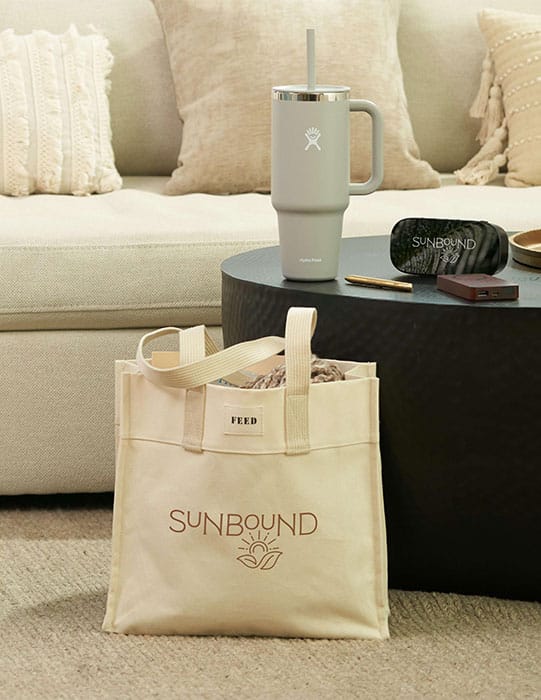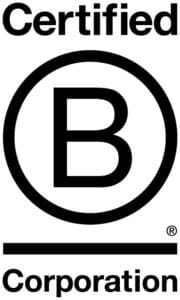
When choosing promotional products, you normally consider how the style, functionality, material and imprint area would fit into your brand and event audience. You may also care about whether your promotional product marketing campaign has an impact on the environment and community. This blog post is all about the different brands that we partner with that are eco and socially conscious; they are committed to offering products that have a lower environmental impact, have a fair trade, sourcing sustainable materials and are making a positive impact in their communities.
Every time we choose recycled materials over virgin materials, our carbon footprint is reduced by 45-50%! Therefore we are committed to bringing you brands that focus on using recycled materials, materials that are more recyclable, materials derived from renewable resources, or helping reduce single-use plastics. When we select eco-friendly promotional products in every marketing campaign, the difference we make as an industry will be phenomenal and can make a huge impact.
Recyclable Materials – Recyclable products are those made with materials, like aluminum and glass, that can be recycled again and again, with no loss of material and are capable of being used to make similar products.
Renewable Materials – A renewable material is made of natural resources that can be replenished, again and again, like Bamboo and Acacia Wood, and contributes to a better conserved planet. Bamboo is a natural, renewable resource. It is a fast-growing plant that thrives without fertilizer or pesticides and requires significantly less water to grow, making it the perfect resource to harvest again and again. Acacia wood is a natural, renewable resource because acacia trees are rapid-growing and are abundant in the world. With over 1,300 different varieties available, acacia wood is accessible in almost every market. Bamboo and acacia wood are found in many promotional products from phone chargers, coasters, water bottles and many home products.
Recycled Materials – Recycled-content products are made from materials that would otherwise have been discarded. Examples of these materials include rPET and recycled cotton. Recycled PET (rPET) is PET that has already been used at least once, recycled and put back into use. It is a more sustainable version of raw PET and has a smaller carbon footprint. Recycled cotton is sourced from pre-consumer waste, or excess materials generated during the production of fabrics. Cotton recycling mitigates waste and is a more sustainable alternative to disposal, as harvesting raw cotton is resource intensive. rPET and recycled cotton can be found in many tote bags, t-shirts, water bottles, and power banks. Many sustainable corporate apparel including t-shirts, polos are now available in recycled polyester and recycled cotton.

Here are the brands that we partner with that make a significant effort to incorporate the materials that we have mentioned:
Patagonia – 72% of the line is made using recycled materials, including recycled polyester and recycled nylon.
Osprey – Sustainable carry solutions made with bluesign®-approved recycled fabrics.
Slowtide – Responsibly crafted blankets and towels with premium and sustainable materials.
Klean Kanteen – All bottles are manufactured with 90% post-consumer 18/8 recycled stainless steel. Certified climate neutral and 100% carbon neutral in manufacture and delivery of its products worldwide.
Tentree – 99% of materials used in the line is made of sustainable fibers. Certified climate neutral company.

According to Harvest Business School Online, social responsibilities consists of 3 categories:
Ethical responsibility is ensuring a company is operating in a fair and ethical manner, specifically through fair treatment of all stakeholders including leadership, employees, investors, suppliers and customers. It can be done in many different ways such as setting a higher minimum wage if the one mandated by government does not constitute a livable wage. Similarly, it may also require that raw materials and components be sourced with free trade standards. Another common process is to ensure the manufacturing does not involve slavery or child labor. Apparel companies like Patagonia and Tentree strive for fair wages for their garment factories.
Philanthropic responsibility refers a company’s goal to make the community, society and the world a better place. This can be attained by donating a portion of their earnings towards a cause or causes. Some companies even create their own trust or foundation to make a positive impact on their missions.
Economic responsibility is an organization’s goal to back all of its financial decisions in its commitment to do good. It balances its profits with the goal to positively impact the environment, people and community.
Patagonia – engages in fair trade programs for its workers and 77% products are made in certified fair trade factories. C
Tentree – clothing line made in factories that adhered to their ethical manufacturing guidelines. With every purchase Tentree partners with organizations to help more trees planted in much needed areas.
Miir – every product sold will fund a grant towards a non-project organization or community project.
Klean Kanteen – 1% of each sale is donated into organizations working hard to make the world a better place.
Hydro Flask – founded Parks For All program that supports nonprofit organizations focused on building, maintaining, restoring and providing more equitable access to parks.
FEED – Every FEED product provides school meals to children, the company works with three partners and in over 20 countries – that translates to over $14 million in support.
 Some companies go one step further by becoming a B-Corp Certified Corporation.
Some companies go one step further by becoming a B-Corp Certified Corporation.
According to B Lab, the non profit behind B-Corp: “Certified B Corporations are businesses that meet the highest standards of verified social and environmental performance, public transparency, and legal accountability to balance profit and purpose. B Corps are accelerating a global culture shift to redefine success in business and build a more inclusive and sustainable economy.”
B Corp companies go through a rigorous certification process to improve their social and environmental performance. It’s not just talk, they have to prove it. They’re committed to using business as a force for good – and they must have their practices be independently vetted by a third-party and to make their results public.
Companies that are available on promotional products market: Patagonia, Klean Kanteen, tentree, Miir, Karst, FEED
If you are planning a promotional products campaign and are interested to explore some eco and socially responsible brands, please contact us or leave a comment below!